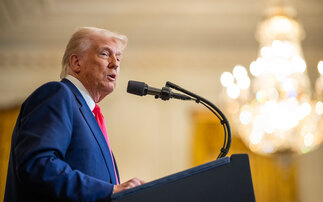Coalition of more than 30 German businesses demands an overhaul of EU climate and energy policy in the wake of Paris Agreement
A group of more than 30 German businesses, including sports brand Adidas, supermarket Aldi and cruise company Aida, has called on both the German government and European Union to adopt more ambitious climate targets in light of the global climate deal struck this weekend.
In total 34 companies released a joint declaration yesterday welcoming the UN climate deal as a "turning point" for low-carbon development, and demanding an "ambitious framework for decarbonisation" is now introduced in Germany and the European Union.
The firms, which also include Puma, Commerzbank, and utility company EnBW, want to see Germany adopt a raft of new climate targets - including a Climate Action Plan that seeks to deliver 80 per cent to 90 per cent emissions reductions by 2050.
The coalition also demands "comprehensive reform" of the European Emissions Trading Scheme and a rise in energy efficiency targets from 27 per cent to 40 per cent by 2030.
Transportation is highlighted as a key sector where further progress is needed, with the businesses calling for a goal to reduce greenhouse gasses from the sector by 95 per cent by 2050, against a 1990 baseline. This can be achieved by expanding rail networks and accelerating the adoption of electric vehicles, according to the declaration.
The declaration was co-ordinated by three German business associations - Foundation 2 Degrees, BAUM eV and German Watch.
In the joint statement the businesses commit to being "pioneers" in the low-carbon energy transition.
"We are well aware of our responsibility as companies and we are ready to do our part to limit the global temperature increase to 2 degrees," the statement reads. "We are committed to acting as pioneers in this new global transition. Therefore, we expect German and EU policymakers to provide a clear, long‐term, and ambitious regulatory framework for this transition."
Similar sentiments are being voiced throughout the EU. Yesterday, a host of experts called on the UK government to re-think its energy policy, warning that a major U-turn is needed for the country to meet its climate commitments. Business leaders including Carolyn Fairbairn, director-general of the Confederation of British Industry and Jeremy Leggett, founder of renewable energy giant SolarCentury, said the UK government must do more to provide a stable investment environment for low-carbon projects.
However, there was less encouraging news for green businesses this week from the Czech Republic where renewable energy producers are warning they face bankruptcy because of the country's Energy Regulatory Office (ERO) refusal to announce crucial subsidy support levels for 2016.
Under Czech law renewable energy producers are entitled to subsidy support throughout the lifetime of installations. However, the ERO has refused to announce its pricing decision on the basis that the support scheme has not been examined by the European Commission - a claim the industry rejects.
Industry bodies warn that up to 25,000 clean energy firms and domestic energy producers are at risk from the stalemate, as well as banks that have loaned money for green energy projects.
This article is part of BusinessGreen's Road to Paris hub, hosted in association with PwC.









